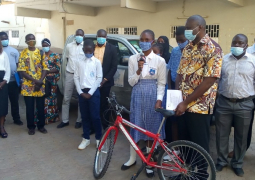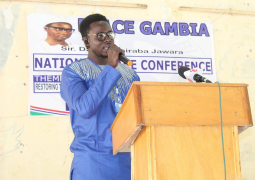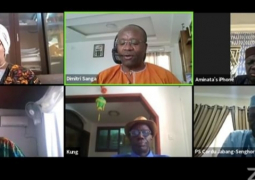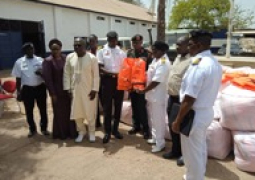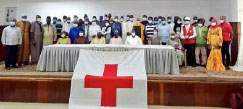
The one-day session held at Paradise Suites Hotel, was aimed at enhancing the capacity of volunteers to effectively and efficiently respond to future disasters as well as review the operational mechanisms and disaster response capacity of the National Society.
It was also designed to brainstorm ideas that may be useful to continue the strengthening of the National Society based on specific feedback and recommendations presented by partners, beneficiaries and staff involved in the DREF operations.
It could be recalled that two strong windstorms swept across the seven regions of The Gambia on 5th and 7th July 2021, causing loss of lives, livelihoods, and destruction.
Shortly after the disaster, The Gambia Red Cross Society activated its contingency plan and dispatched teams to the affected regions.
GRCS also provided life-saving relief items to the affected communities whilst conducting assessments to establish the extent of the damages and the needs.
The most vulnerable families were provided with sleeping mats, blankets, bed sheets, hygiene, and sanitary items.
Isatou Joof, Disaster Relief Emergency Fund Officer for GRCS, explained that they mobilised funds from the International Federation of Red Cross and Red Cross Society through its Disaster Relief Emergency Fund and supported 505 most affected households.
She noted that 217 households were additionally supported with cash for shelter and household items for three months.
These funds, she added, enabled the GRCS to immediately scale up its response activities across the country.
Abdoulie Fye, Director of Programmes and Operations at GRCS, said when disasters strike it is important to respond within the first hours of the disaster by providing basic services to put people back to their lives in a dignified matter which is critical.
Mr. Fye underscored the importance of data, saying without data there cannot be any meaningful response.
“After the DREF operations we carried out various interventions.”
He expressed their resolve to mobilise more resources to support affected households that needed support but could not be assisted.
Alasan Senghore, Secretary General of GRCS, hinted that transformation process involves timely, quality, adequate, appropriate and accountable response, adding that this helped them respond within 20 hours after the windstorm disaster to mitigate the impact.
Mustapha Yabo, a representative of Office of the President said when emergencies occur, all stakeholders have the same intention; to provide relief to those affected.
He however noted that the primary responsibility rests with Government.
Yabo admitted that Government was not fully prepared for disasters, which he said, was reason why it was late in the response.
He thus appealed that a National response strategy be developed as disaster does not discriminate.
Jato S. Sillah, president of The Gambia Red Cross Society (GRCS) called on government to invest in Early Warning Systems for people to be partly prepared for disasters.
Victims and beneficiaries alluded to similar testimonies especially on their situations after being struck by windstorm before support from GRCS.


